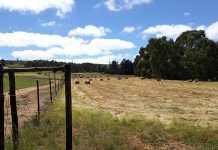In South Africa we have a large number of very good journalists writing for the country’s various agricultural publications. Aside from ‘farming news’, there are also numerous ‘success stories’, covering the strides made by farmers in increasing efficiency, conserving the environment, improving the living standards of farm workers and creating new ways of empowering the previously disadvantaged.
But these almost never reach the mainstream media. Instead, when a small group of alleged farm workers in De Doorns starts a protest, it’s front-page news. The consumer almost never hears the truth about agriculture. The livelihood of commercial farmers depends on receiving a fair price for their products. In SA, the marketing power mostly lies with the three or four major retail chains. These determine ex-factory prices, which become the basis for farm prices. In many cases, producer prices are squeezed to levels at which production becomes unprofitable.
If the consumer understands the amount of effort and inputs needed to produce food, perhaps they’ll accept higher food prices more readily. Currently, there’s a lot of talk about sustainability. Everyone agrees that production must take place without damage to the environment.
What is frequently forgotten, though, is that profitability is a prerequisite for sustainability. A farmer whose business isn’t profitable won’t be able to care for the environment or their employees, or produce affordable food for the community. In addition to the agricultural media, there are a few generic advertising campaigns seeking to ‘enlighten’ the public – but these tend to focus largely on aspects such as nutritional value.
Boring
There’s another problem. ‘Agricultural articles’ are factual and objective. Unfortunately, this makes them very boring to non-farmers – and editors of mainstream publications. Invariably agriculture’s voice is never heard. At the recent World Dairy Summit in Cape Town, Penny de Villiers, CEO of Impi social media, emphasised the importance of ‘storytelling’ in communication, as opposed to simply providing the unadorned facts. Stories are simple, timeless, ‘contagious’ and easy to remember, she said.
Survival
Currently, agricultural journalists rightly see their role as informing farmers about what’s happening in the world. They don’t see their role as informing the world about what happens in agriculture. We need a few dedicated journalists to start trying to do this. However, even if journalists use stories to explain agriculture, there’s no guarantee they will reach the mainstream media. Others can help. Many industries make a lot of money selling inputs to, and buying products from, farmers. These industries can tell the ‘story of agriculture’ in their advertising.
SA’s commercial farmers also have a role to play. There are a few farms that take the trouble to invite school groups and others on to their farms to explain the story of farming to them. We need many more farmers to do this. Commercial agriculture’s survival amid political uncertainty depends on the support farmers can get from the population. If we keep our stories to ourselves we won’t win the public’s sympathy.
The story of agriculture is a good one. We must just ensure that everyone hears it.
Dr Koos Coetzee is an agricultural economist at the MPO. All opinions expressed are his own and don’t reflect MPO policy. Contact Dr Coetzee at [email protected] with ‘Global farming’ in the subject line.




